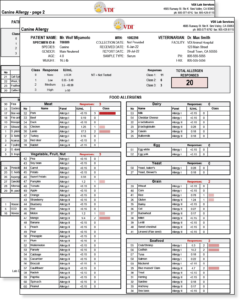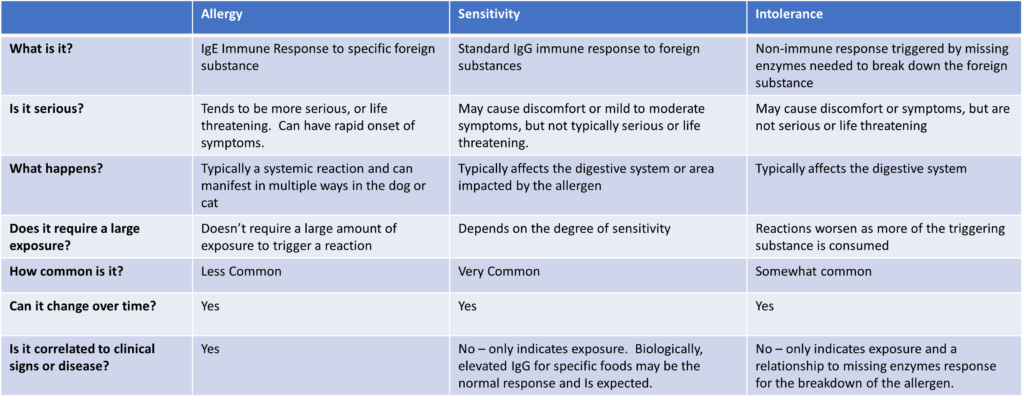
Allergy Testing
With just 0.3mL serum, get 125 allergens tested. The lowest volume, best value true allergy test available.
Allergy Panel – Overview
Canine or Feline
Allergy testing should be accessible, easy, and cost-effective for our pets. Detecting true allergies, not sensitivities and intolerances, is a simple process that can have profound results on their long term health. VDI now offers affordable allergy testing to compliment the other wellness and acute care testing already being done through the lab.
| # of Allergens | 125 |
| Allergens by type | 72 – Food 50 – Environmental 3 – Other |
| Antibody Type | IgE |
| Volume Needed | 0.3 mL – Serum |

The VDI Advantage
• Affordable testing
• Very small sample volume
• Easy to combine with other VDI tests
Which pets should test?
- ADR pets with undiagnosed GI signs
- Chronic GI distress
- Scratchy, Itchy, Red, or inflamed Skin
- Chronic Ear Infections/ Head shaking
- Excessive Licking
- Hair loss
- Chronic Cough / Sneezing
- Runny Eyes
- Diarrhea or Vomiting with unknown source
- Or as part of general wellness screening
What’s Needed?
- Minimum: 0.25 mL – 0.3 mL serum. We we ask for more if possible (~1.0mL), especially if running other VDI tests.
- Fasting not required
- Can be added to other routine VDI tests
- No indication that Antihistamine & cyclosporine interfere. Apoquel & glucocorticoid therapy is not shown to interfere.
Reports Include:
- Allergens listed by group
- Allergen response intensity and class
- Total allergen response count
- Cross-reactivity information
- Semi-quantitative results
Sample Reports:

Meet the Allergens
Food (72 Allergens)
MEAT
Beef
Chicken
Duck
Lamb
Pork
Rabbit
Red Deer
Turkey
SEAFOOD
Anchovy
Blue mussel/ Clam
Codfish
Crab/Shrimp
Herring
Mackerel
Salmon
Sardine
Sea Bass
Trout
Tuna
VEGETABLE, FRUIT, & NUTS
Apple
Banana
Blueberry
Broccoli
Cabbage
Carrot
Cauliflower
Cucumber
Kiwi
Mango
Melon
Orange
Paprika
Parsley
Pea
Peach
Peanut
Pear
Pineapple
Plum
Potato
Pumpkin
Radish
Soy Bean
Spinach
Strawberry
Sweet Potato
Tomato
Watermelon
GRAIN
Barley
Buckwheat
Corn
Gluten
Lentil
Linseed (Flax Seed)
Millet
Oat
Rice
Sweet Chestnut
Wheat
DAIRY
α-lactalbumin
β-lactoglobulin
Buttermilk
Casein
Cheddar / Gouda cheese
Milk
EGG
Egg White
Egg Yolk
YEAST
Baker’s Yeast
Brewer’s Yeast
Insects and Mites (12 Allergens)
INSECT
Bee Venom
Cockroach
Fire Ant
Flea
Mosquito
Silkworm pupa
MITE
Acarus siro
B. tropicalis
D. farinae
D. pteronyssinus
G. domesticus
T. putrescentiae
Plants (29 Allergens)
TREE
Acacia
Alder / Birch
Hazel
Japanese Cedar
Maple leaf sycamore
Oak
White Ash
White Pine
Willow / Cottonwood
GRASS
Bent grass
Bermuda grass
common reed grass
Cultivated rye
Orchard / Timothy grass
Ryegrass
Sweet vernal grass
WEED
Common pigweed
Common ragweed
Dandelion
Goldenrod
Japanese hop
Mugwort
Ox-eye daisy
Plantain
Russian thistle
Sheep’s sorrel
Animal, Mold, and Other (13 Allergens)
ANIMAL
Cat or Dog Dander/Epithelium*
Cattle Epithelium
Feather Mix
Wool, Sheep
*Canine dander is tested on cats, and feline dander is tested on dogs.
MOLD
Alternaria alternata
Aspergillus fumigatus
C. herbarum
Candida albicans
M. pachydermatis
Penicillium notatum
OTHER
CCD
Havea latex
House dust

More About Allergy Testing
Allergy vs Intolerance vs Sensitivity
The primary difference between an allergy, a sensitivity, and an intolerance is that an allergy results in an immune system reaction to a substance, while a sensitivity or intolerance involves no immune response. While the later may result in occasional discomfort for your pet, they are typically not the significant kind of immune response that may occur with allergies. VDI’s Allergy Panels test for true allergies.

Allergy
Although the word “Allergy” is colloquially used to describe any reaction to a foreign substance, it’s not wholly accurate. A true allergy describes a reaction produced when the body meets a normally harmless substance, which has been “remembered” from a previous exposure and subsequently produces the “IgE” antibody.
In order for an allergy to develop, a pet must be exposed to the substance at least once before the allergy will manifest. The immune system learns to attack this particular substance for an unknown reason, at which point the immune response will go into hyperdrive to attack it – resulting in elevated IgE levels.
Sensitivity
A sensitivity is a delayed immune reaction resulting in the production of “IgG” antibody to a foreign substance, typically food. Though they may cause some clinical signs this type of reaction is not an allergic reaction and does not carry the same seriousness as a true allergy.
IgG testing for sensitivity is readily available however it has not been correlated to clinical signs or disease, given that IgG response is the body’s natural response to consuming any foreign substance and is expected. Additional IgG testing has been shown to produce several “positives” which may lead to over-restriction of the diet.
Concerningly, patients with food intolerances acting on the results of IgG panels may see improvements because the large number of foods they must eliminate may remove the culprit from their diet by coincidence. However, over-restriction can have impacts as it may place a patient at risk of nutritional deficiencies.
Intolerance
An intolerance is the body’s inability to breakdown certain foods due missing or reduced enzymes responsible for that metabolism. This can result in clinical signs and discomfort for the pet. An example of an intolerance would be lactose intolerance – the absence of the enzyme lactase to break down dairy products results in GI discomfort. Intolerances do not produce either IgE or IgG antibody responses.
Options for pets with Allergies
The veterinarian is the best resource for discussing options for therapy if a pet has been shown to have allergies. There are a few common options that may suitable including:
- Avoidance of the Allergen (preferred if possible)
- Diet changes where appropriate such as hydrolyzed diets.
- Medications to manage symptoms (steroids, antihistamines, etc) for the short term
- Immune system support (e.g. EFA, Vitamin D, Nutraceuticals)
- Hyposensitization (desensitization) / Immunotherapy
Desensitization & Immunotherapy
Immunotherapy (aka desensitization, hyposensitization, or allergy shots) is a method reducing the body’s sensitivity to the specific allergen causing the reaction. By introducing a specialized extract containing the offending allergen in small quantities over time, the goal is to minimize the pet’s reaction to it, thus eliminating the need for medicines such as steroids which come with side effects.
Although it has been shown effective, immunotherapy does work differently for every pet and may take up to a year of consistent therapy to see noticeable results.

